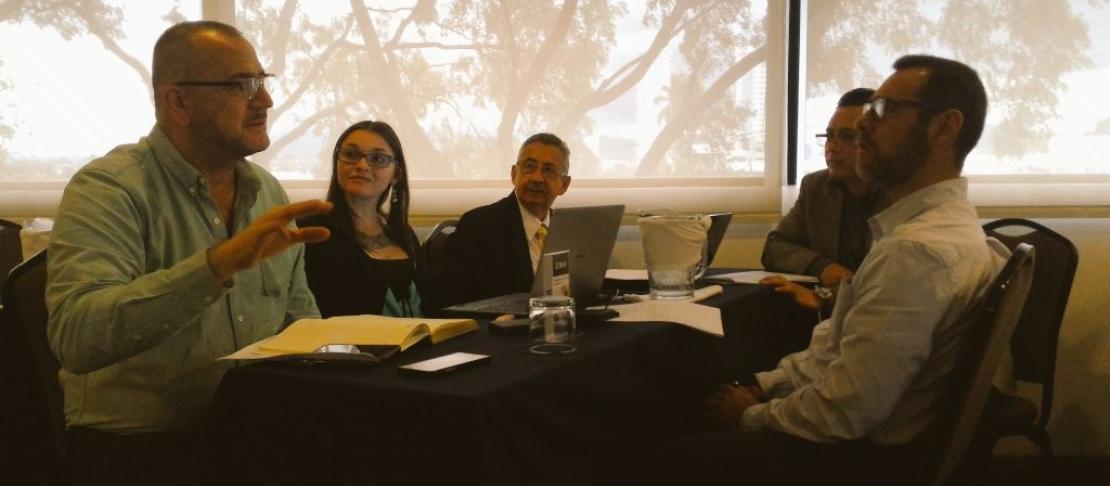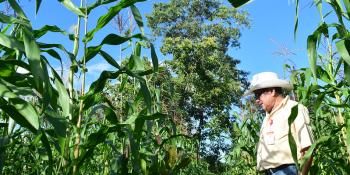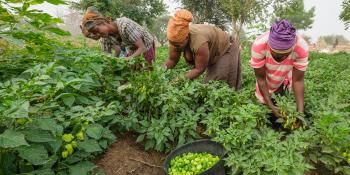First steps to develop climate-smart agriculture strategy for Central America and the Dominican Republic

Representatives from Costa Rica, Guatemala, Honduras, Panama and the Dominican Republic of the Central American Agricultural Council met to lay the foundations of the regional strategy for climate-smart agriculture.
Through an intensive workgroup during the workshop held on December 8 and 9 2016, experts from the Technical Group on Climate Change and Integrated Management of Risk (GT-CC&GIR in Spanish) and other technical groups of the Central American Agricultural Council (CAC) identified the axes and strategic lines, as well as the main actions that can be promoted, encouraged and articulated at the regional level so that the agricultural sector of the CAC countries become climate-smart.
The initiative for the formulation of the CSA Strategy for Central America and the Dominican Republic is a product of a number of agreements established by the CAC, including the agreement signed in September 2015 which approves the regional proposal on the relations between productivity and climate, which contains in article 1: "To promote climate-smart agriculture, as an option to increase agricultural, fishery, aquaculture and forestry productivity, and to support the adaptation to climate change, in order to improve food and nutrition security. Also, to promote the adaptation of agriculture to climate change as a regional public good."
In addition, in the context of the COP21 in Paris, Central American countries represented by the Ministers of Agriculture of Costa Rica and Guatemala declared the support and promotion of climate-smart agriculture (CSA). The development of the Strategy will continue in the first half of 2017 under the pro tempore presidency of Costa Rica, making this initiative one of the priorities of the agenda.
The technical support for the development of the CSA Strategy is being carried out by an Inter-Agency Group that supports the CAC, made up of institutions such as the Economic Commission for Latin America and the Caribbean (ECLAC), the Inter-American Institute for Cooperation Agriculture (IICA), the Food and Agriculture Organization (FAO), the Tropical Agriculture Research and Higher Education Center (CATIE), and the CGIAR Research Program on Climate Change, Agriculture and Food Security (CCAFS), among other institutions. CCAFS is in charge of coordinating closely with the Executive Secretariat of CAC the development and participatory validation of the Regional Strategy.
During the workshop, strategic axes and pathways were identified in each of the CSA pillars, including food and nutrition security, family farming, the implementation of climate-smart practices and technologies in value chains, as well as the promotion of adaptation measures that contribute to the reduction of greenhouse gases and/or carbon sequestration, and some of them were widely discussed.
In the same way, the group acknowledged the progress that countries have reached on topics such as the Nationally Appropriate Mitigation Actions (NAMAs) for livestock and coffee in Costa Rica, the implementation of Local Agroclimatic Commitees in Honduras, the prioritization of CSA practices for the Guatemalan dry corridor, among others, as inputs and learning experiences that will strengthen the processes of sharping the Strategy.
The next steps include virtual review and feedback from other countries in the region, as well as international technical institutions. In addition, a second workshop will be held at the beginning of 2017 in which, using the Future Scenarios methodology developed by CCAFS and implemented by the University for International Cooperation (UCI) of Costa Rica, to strengthen even more the Regional Strategy, assessing it against diverse and plausible future scenarios with stakeholders from the different technical groups of CAC, Ministries of Environment, private sector, academia and research, among others.
Learn more
News from the CAC Secretariat (in Spanish): Primeros pasos en la construcción de la Estrategia de Agricultura Sostenible Adaptada al Clima para Centroamérica y República Dominicana.
Media outreach (in Spanish): Primer impulso para adaptar la agricultura sostenible al clima en Centroamérica
Deissy Martínez Barón is Science Officer for CCAFS Latin America. Ligia Córdoba is International Cooperation, climate change and agriculture officer for The CAC Executive Secretariat.


